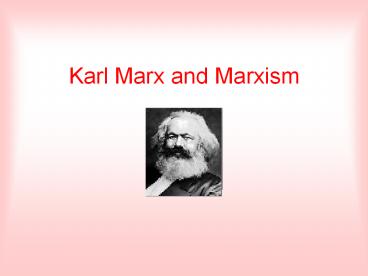Karl Marx and Marxism - PowerPoint PPT Presentation
Title:
Karl Marx and Marxism
Description:
Karl Marx and Marxism Biography Born 1818 in Trier Jewish extraction Studied philosophy and economics in Berlin Married Jenny von Westphalen Earned his living (badly ... – PowerPoint PPT presentation
Number of Views:621
Avg rating:3.0/5.0
Title: Karl Marx and Marxism
1
Karl Marx and Marxism
2
Biography
- Born 1818 in Trier
- Jewish extraction
- Studied philosophy and economics in Berlin
- Married Jenny von Westphalen
- Earned his living (badly) as a journalist
- Died 1883 in London having only written 3 of the
planned 8 volumes of Das Kapital.
3
Jenny von Westphalen
- Marx adored Jenny.
- They were engaged for seven years before her
family would allow a marriage. - They lived off her wealth.
- He died soon after her, not wishing to be alone
without her.
4
Politics
- Marx was a communist.
- He wrote The Communist Manifesto with his friend,
Friedrich Engels in 1848. - He had three kinds of writing
- Journalism
- Political polemic
- Analysis of society and culture.
5
Engels on Marx
- His real mission in life was to contribute, in
one way or another, to the overthrow of
capitalist society and of the state institutions
which it had brought into being, to contribute to
the liberation of the modern proletariat, which
he was the first to make conscious of its own
position and its needs, conscious of the
conditions of its emancipation. His name will
endure through the ages, and so also will his
work.
6
Marxism
- Communism is a political philosophy which argues
that men should have equal rights to wealth. - Marxism is a way of understanding and analysing
the organisation and structure of society. It is
also a way of understanding how societies develop
and change.
7
Marxs role in history
- When Marx died, he was not well known except in
revolutionary circles. - After his death, his writing prompted a number of
politicians to lead revolutions in his name. - Many of these societies were totalitarian.
- His philosophy underlies the thinking of many
political parties old Labour for example.
8
Conflict theory
- All societies are divided into two groups
- Owners
- Workers
- Our society is capitalist.
- Owners are bourgeoisie
- Workers are proletarians
9
Marx on history
- The history of all hitherto existing society is
the history of class struggle.
10
Owners and workers
- Owners exploit workers and live off the money
which the workers earn - Workers put up with this inequality because
- They are oppressed wage slaves and cannot fight
the system - They are indoctrinated by ideology and religion
into believing what they are told by the powerful.
11
Marx on the workers
- The worker becomes all the poorer the more
wealth he produces, the more his production
increases in power and range.
12
Cardiff Who paid?
13
Marx and The Revolution
- Marx predicted that wealth would belong to fewer
and fewer people. - The workers would eventually realise their
position and overthrow the bourgeoisie - There would be an armed revolution which would
begin in Britain. - It would happen in the very near future.
14
What happened?
- The biggest problem with Marxism is that the
predicted revolution never occurred in the form
he said it would. - People are not poorer.
- Wealth is not concentrated in the hands of a few
rich people. - Britain hasnt had a Communist revolution yet and
is not likely to in the near future.
15
Marx in his own words - 1
- Men make their own history, but they do not make
it just as they please they do not make it under
circumstances chosen by themselves, but under
circumstances directly found, given and
transmitted from the past. The tradition of all
the dead generations weighs like a nightmare on
the brain of the living.
16
Marx in his own words - 2
- History repeats itself, first as tragedy, second
as farce.
17
Marx in his own words - 3
- The writer may very well serve a movement of
history as its mouthpiece, but he cannot of
course create it.
18
Marx in his own words - 4
- In bourgeois society capital is independent and
has individuality, while the living person is
dependent and has no individuality.
19
Conclusion
- Marxism is a political philosophy your views
are your own and not required in sociology. - Marxism is an understanding of the nature of
social relationships which you are expected to
evaluate. Recognise that it has strengths and
weakness as a tool of understanding of our
culture.
20
The end
- For further information read books and visit
websites. There are thousands available for you.































